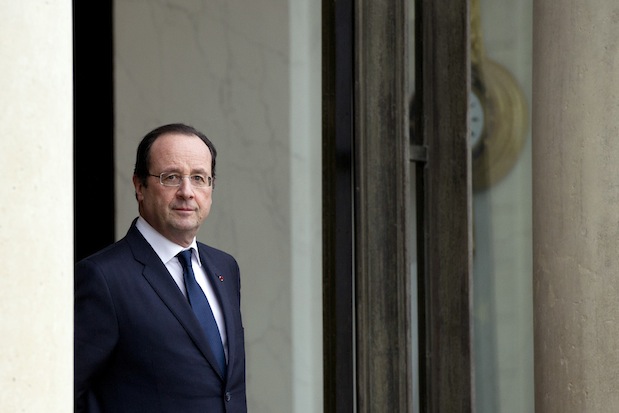I’ve always respected stationmasters, but that sentiment is not universally shared. A distinguished friend of mine across the Channel described François Hollande the other day as ‘un chef de gare, sans aucune dignité’ — and it’s not difficult to picture the little president, peaked cap awry, trousers unbuttoned, haplessly waving his whistle as the last train à grande vitesse departs for the Eurotunnel laden with talented compatriots who see no future in France.
As modern socialist leaders go, Hollande is beginning to make Gordon Brown look statesmanlike. Nicknamed ‘Flanby’ after a cheap custard pudding, he has left decision-making to his ragbag of ministers and done nothing to steer France towards economic recovery. He was finally stirred into a response by global attention to his sex life, but the big gestures in his press conference last week — a €30 billion cut in payroll taxes and a €50 billion reduction in public spending — can have scant impact before 2017 when, if his party lets him stand again, Hollande will face re-election. By then, the UK should overtake France to become Europe’s second largest economy behind Germany, and London will have a bigger French population than Clermont-Ferrand.
The French have long been reluctant to correct the over-dominance of the state in their economy because they believe the high quality of life they have enjoyed in recent decades is the product of well-directed public investment. They’re not entirely wrong about that, but it can’t go on if their taxes won’t pay for it and the private sector that drives growth is suffocated — while financial markets are on constant watch for the incipient debt crisis that has recently been labelled the ‘baguette bomb’.
Most damaging to France’s future prosperity are multiple disincentives to entrepreneurship, self-employment and hiring anyone to do anything. Start a new business and you’ll pay thousands of euros in tax and registration fees before you find your first customer. Take on a caretaker who expects to be paid through the official ‘cheque emploi service universel’ system and you’ll cough up 11 separate categories of social security contribution amounting to 70 per cent of her wage. In short, someone should take an axe to the whole contraption of discouragements to effort and innovation.
But it’s hard to imagine even a nation of statists like the French re-electing a nincompoop whose inactivity and boudoir distractions have caused his country to miss the entire global economic upswing. Come 2017, this stationmaster might as well turn out the lights on the empty platforms, swap his cap for a scooter helmet, and slip back to his next mistress’s apartment.
Not so much a plan
Our own would-be socialist leader Ed Miliband took a barrage of City flak for his half-baked scheme to force the ‘big five’ banks to sell off branches in the interest of generating greater competition in small business lending and savings products. I have long been an advocate of ‘challenger banks’ that might bring localism and the lost art of relationship banking back to the high street, so I don’t dismiss Miliband’s plan out of hand — except, of course, that like his ‘energy price freeze’ it isn’t really a plan at all, just another political missile designed to distract attention from a rapidly improving economy and position himself as the voters’ champion against big capitalism.
He and Ed Balls must have been disappointed that the announcement did not cause a bigger fall in bank share prices, because it was also clearly designed to spike George Osborne’s hopes of selling off the taxpayers’ remaining 33 per cent stake in Lloyds any time soon. A first institutional placing last September of 6 per cent of the recovering bank went well, but accusations that the Royal Mail sell-off a month later was ‘botched’ have made some ministers jumpy about further attempts to tap the market. Osborne, however, likes nothing better than an exchange of political artillery, and one rumour has it that he will now bring the Lloyds sale forward to the earliest possible date, in late February, just to spike Labour’s guns in return.
Landlords and tenants
Is our home-owning democracy becoming by default a nation of landlords and tenants? My eye is caught both by a TV ad for boiler repair services aimed at owners of multiple properties, and by a Savills survey showing that Britain’s private landlords, of whom there will soon be a million, have profited mightily from rising house prices over the past decade: the equity in their properties is estimated to have grown from £384 billion to £818 billion.
What with negligible savings rates, falling gold and uncertain stock markets on one side, government oiling of the mortgage market on the other, and gross rental yields of 6 per cent plus, buy-to-let has looked steadily more attractive for investors. In London, every development of new flats these days is marketed primarily as a buy-to-let opportunity: more than 70 per cent are bought by foreigners, a high proportion as safe-haven investments to be rented out, while domestic buyers are often City boys swapping cash bonuses for bricks and mortar.
Meanwhile, wannabe first-time owner-occupiers press their noses to estate agents’ windows and complain that the dice have never been more loaded against them — with politicians ever eager to take their side. But we forget the negative effects of our national urge to be home-owners, debt-laden as we have to be to fulfil that desire. A fluid rental sector is good for labour mobility and new-business growth; a continental system in which couples rent until they are comfortably able to buy the one home in which they hope to live for the rest of their lives makes for less volatility in house prices. As buy-to-letters count their riches while your offspring look forlornly at basements they can’t afford in distant suburbs, you may not see this as a turn for the better. But in the long run I suspect it might be.
Got something to add? Join the discussion and comment below.
Get 10 issues for just $10
Subscribe to The Spectator Australia today for the next 10 magazine issues, plus full online access, for just $10.
You might disagree with half of it, but you’ll enjoy reading all of it. Try your first month for free, then just $2 a week for the remainder of your first year.















Comments
Don't miss out
Join the conversation with other Spectator Australia readers. Subscribe to leave a comment.
SUBSCRIBEAlready a subscriber? Log in